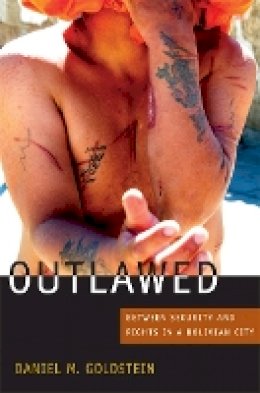8%OFF

Stock image for illustration purposes only - book cover, edition or condition may vary.
Outlawed: Between Security and Rights in a Bolivian City
Daniel M. Goldstein
€ 36.99
€ 33.95
FREE Delivery in Ireland
Description for Outlawed: Between Security and Rights in a Bolivian City
Paperback. Between Security and Rights in a Bolivian City. Series: A John Hope Franklin Center Book. 344 pages, 9 photographs, 1 map. Illuminates the complex interconnections between differing definitions of security and human rights. Cateogry: (P) Professional & Vocational. BIC Classification: 1KLS; JFC; JFSL9. Dimension: 232 x 159 x 21. Weight: 508.
In Outlawed, Daniel M. Goldstein reveals how indigenous residents of marginal neighborhoods in Cochabamba, Bolivia, struggle to balance security with rights. Feeling abandoned to the crime and violence that grip their communities, they sometimes turn to vigilante practices, including lynching, to apprehend and punish suspected criminals. Goldstein describes those in this precarious position as "outlawed": not protected from crime by the law but forced to comply with legal measures in other areas of their lives, their solutions to protection criminalized while their needs for security are ignored. He chronicles the complications of the government's attempts to provide greater rights to ... Read more
In Outlawed, Daniel M. Goldstein reveals how indigenous residents of marginal neighborhoods in Cochabamba, Bolivia, struggle to balance security with rights. Feeling abandoned to the crime and violence that grip their communities, they sometimes turn to vigilante practices, including lynching, to apprehend and punish suspected criminals. Goldstein describes those in this precarious position as "outlawed": not protected from crime by the law but forced to comply with legal measures in other areas of their lives, their solutions to protection criminalized while their needs for security are ignored. He chronicles the complications of the government's attempts to provide greater rights to ... Read more
Product Details
Format
Paperback
Publication date
2012
Publisher
Duke University Press
Number of pages
344
Condition
New
Number of Pages
344
Place of Publication
North Carolina, United States
ISBN
9780822353119
SKU
V9780822353119
Shipping Time
Usually ships in 7 to 11 working days
Ref
99-1
About Daniel M. Goldstein
Daniel M. Goldstein is Associate Professor in the Department of Anthropology at Rutgers University. He is the author of The Spectacular City: Violence and Performance in Urban Bolivia and a coeditor of Violent Democracies of Latin America, both also published by Duke University Press.
Reviews for Outlawed: Between Security and Rights in a Bolivian City
“Daniel Goldstein has written an elaborate and rich ethnography of the‘present absence’ of the Bolivian state in a marginal barrio in the city of Cochabamba...In many ways, Goldstein’s book is a testimony to ethnography at its best: it elucidates large critical issues by way of meticulous attention to local contexts and dynamics.” - Anders Burman, Journal of Latin American Studies ... Read more
